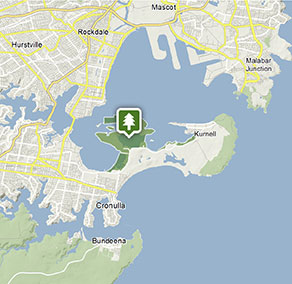School excursion
Ecosystems at risk at Towra Point Nature Reserve
Towra Point Nature Reserve
Info for teachers
Everything you need to know about Ecosystems at risk at Towra Point Nature Reserve.
Program outline
- Welcome, acknowledgement of Country and safety talk
- Examine the human impact caused by horse stables and identify weeds
- Morning tea and toilet break
- Walk through the reserve, noting changes to the physical environment.
- Conduct a transect in a saltmarsh area
- Identify grey mangrove adaptations
- Measure abiotic factors in the saltmarsh area
- Stop at Weedy Pond to identify significant plants and their adaptations
- Lunch at Silver Beach
- Discuss current issues and ecosystem management at Towra Point Nature Reserve
- Recap and farewell
What to bring
Please wear fully enclosed shoes and bring a hat, sunscreen, wet weather gear, and lunch which should be low waste with a refillable water bottle. Students should bring gear in a backpack or similar (not plastic bags). Please note: Insect repelland is strongly advised. Wear a pair of shoes that can get wet and bring a change of shoes/socks and a small towel. Students should bring a clipboard, worksheets, pens and pencils.
Getting there and parking
Towra Point Nature Reserve is located on Captain Cook Drive at Kurnell. Students will be met at the Cronulla Wastewater Treatment Plant carpark on Captain Cook Drive, Cronulla.
Maps and downloads
Risk assessment and risk benefits
Our rangers and guides have the technical skill and experience to assess the risks and the benefits of a variety of activities delivered as part of our learning programs.
We believe in including opportunities that allow students to learn and experience for themselves through exploration in the natural environment.
Please make your own risk assessment based on the information provided. Detailed potential risks and controls are provided for the site to assist teachers in risk management planning. Teachers and carers should be aware of, and consider the needs, abilities and medical conditions of students when visiting this site. The supervision of students remains the responsibility of the teacher. The school must ensure an adequate number of adult supervisors are present.
Accessibility
Disability access level - no wheelchair access
There is no wheelchair access; if you have someone with special needs, please let us know in advance so that we can plan accordingly.

Park info
- in Towra Point Nature Reserve in the Sydney and surrounds region
Towra Point Nature Reserve is accessible by boat only. Access to the land is available on special consent for research and educational purposes only. Contact the local Area office on 9668 2000.
